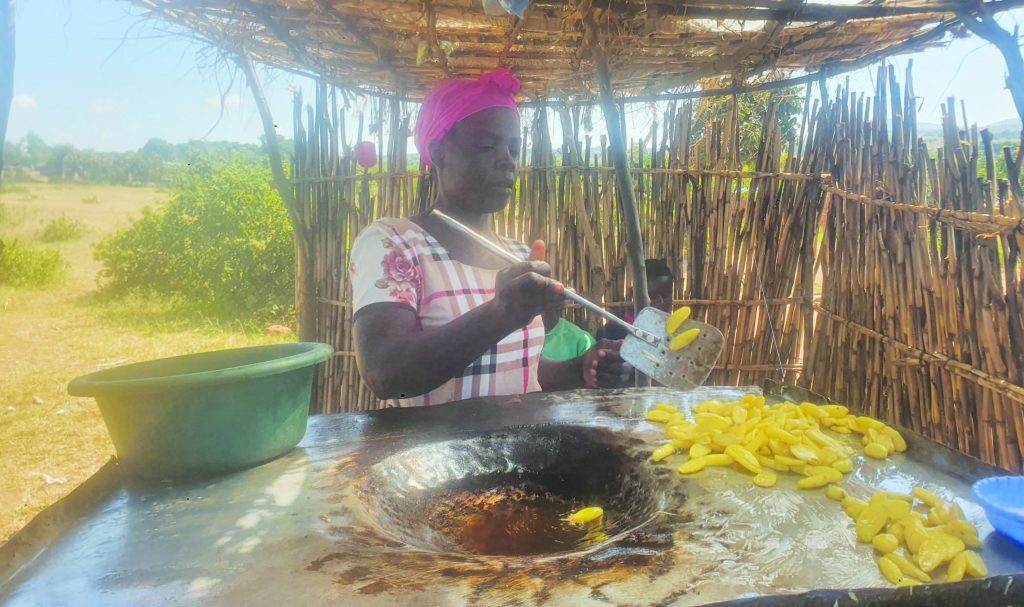Social cash transfer breeds self-reliance
The first time Thomas Abraham from Chinyama Village, Traditional Authority (T/A) Nkukula in Dowa received money from the Mtukula Pakhomo Programme or social cash transfer, he was relieved to buy basic household items which he previously could not afford.
With time, the 61-year-old resolved that his six-member family needed a better house, so he moulded and cured bricks to build the house they now live in, with funds from the Social Cash Transfer Programme (SCTP).

Later, he bought a pig which would soon have seven piglets. He sold five of them for K200 000 and bought 30 iron sheets.
Explains the father of four: “I sold one more pig to buy timbers for the roofing. Now I have the one thing that I always wanted—a house because of Mtukula Pakhomo.
“Apart from that, with the funds I can also afford my children’s school uniforms and supply their other needs.”
As he gets older, he feels he needs better means of mobility to graduate from his current use of a bicycle to a motorcycle.
“I save part of the money I get in a village savings and loans group. I hope to buy a motorcycle with those savings,” says Thomas.
Likewise, 45-year-old Mary Makina and her household from N’gombaila Village, T/A Nkukula, were also struggled as she explained: “I used to do manual jobs, drawing water in construction projects to earn some money, but it was not enough.
“And even though we were also farming, it was not going so well. Our harvests were never enough because we lacked fertiliser. There were times when we only ate once a day.”
Through Mtukula Pakhomo, the family now owns some livestock. They also sell tomatoes and chips. They too have also constructed a bigger house which they will soon roof with iron sheets.
“The first time we received the money, we used K5 000 to buy tomatoes for the business and now we also sell fried potatoes,” explains the mother of six, who says on a good day they make about K10 000 from the businesses.
As they plan to roof and plaster the house, she encourages other Mtukula Pakhomo beneficiaries to think of all the ways they can grow the money they get no matter how little it is and do worthwhile things.
Makina is confident that they have made a good business foundation and can carry on long after Mtukula Pakhomo. With the goats and chickens they now have, they can never be as poor as they were before because as the livestock reproduces, they can also sell some to meet their needs.
Meanwhile, Chinyama Community Social Support Committee member Ferson Lemson was happy that beneficiary families now send their children to school.
He says: “The number of children going to school among the families under Mtukula Pakhomo has increased. Food is also no longer a problem in most beneficiary households.
“It is also good that many of them have built better houses and have some livestock to help them both in their nutritional needs and income to support their families.”
Dowa district social welfare officer Lucky Gama said there have been many encouraging developments among the beneficiaries of the programme, which aims to address health, nutrition, education and shelter problems for the poorest.
“Many beneficiaries are running businesses to supplement their income. Apart from that, most of their households have improved. There are a lot of positive sides to the programme,” he says.
The SCTP, a project that is currently under the Masaf IV successor project, the social support for resilient livelihoods project, has been providing financial relief to over 293 000 ultra-poor and labour constrained households in the country since 2006.
In an earlier presentation, Ministry of Gender, Community Development and Social Welfare chief social welfare officer Innocent Phiri said the SCTP fits the bill, having led to improved health and nutrition, with over 80 percent of the households reporting intensified food diversity with meat, fish and dairy products.
He says it has also led to increased school enrolment from 87 to 95 percent and improved retention and performance among school-going children from the beneficiary households.
Apart from that, he said it has increased livestock ownership among the beneficiaries adding: “About 90 percent of the households purchased livestock, leading to increased livestock ownership by seven times.
“There is also improvement in housing and living conditions among the beneficiary households.”
However, realising that cash alone is not enough to reduce poverty and malnutrition and improve health conditions, experts said there is need for complementary interventions so that the beneficiaries can access existing social services that would help them to maximise the impact of the transfers they are receiving.
Comsip Cooperative Union is implementing the livelihood support programme, which incorporates basic and enhanced livelihoods packages through a cash plus approach.
Comsip operations manager Susan Kondowe said the project aims to instill a savings and investments culture among SCTP and Climate Smart Public Works Programme beneficiary households to cushion them in times of shocks.
“The programme specifically aims at instilling the culture of savings and investment as well as increasing household incomes and productive assets through diversified income generating activities among others,” she says.
Through such programmes, government wants to see people such as Makina and Abraham going beyond consumption to being more productive and resilient and be able to sustain their livelihoods through savings and improving their household earning capabilities.






One Comment